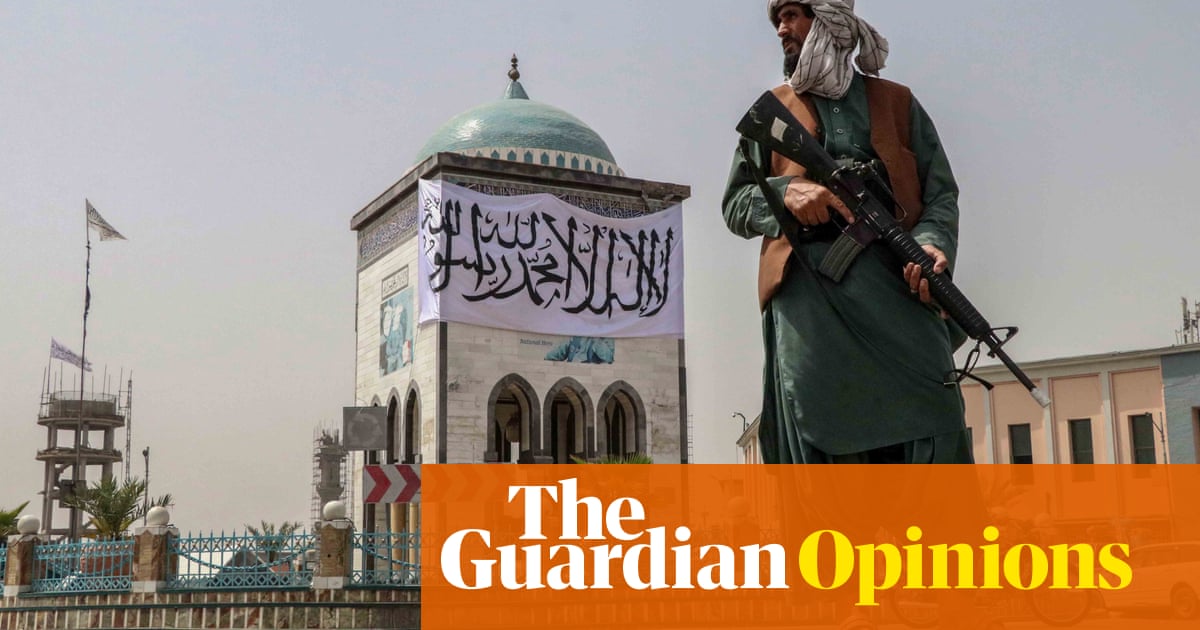
Show caption Taliban fighter standing guard at a checkpoint in Kandahar, Afghanistan, 17 August 2021. Photograph: EPA Opinion Afghanistan, Iraq, Libya, the Islamic State: western intervention is a catalogue of failure Paul Rogers This week’s victory by the Taliban in Afghanistan now stands as an inspiration to militants around the world Tue 17 Aug 2021 17.00 BST Share on Facebook
Share on Twitter
Share via Email
Although the anti-war mood deepened in the UK in 2002, as President George W Bush moved to terminate the regime in Iraq, there had already been some unease the previous October, before the Afghan war started. One policy paper, which I co-authored, even argued against it, pointing to an inevitable escalation and the risk of never-ending war. But for the most part the defence establishment offered support.
In the event, the Taliban fell in a matter of weeks and Bush could announce, in his 2002 state of the union address, an expanded war against an “axis of evil”, with Iraq first in the sights. Even by mid-2002 the US, UK and others had moved on from Afghanistan, leaving a dangerous security vacuum, which was filled by a returning Taliban, across many rural districts, ultimately setting in motion the events that culminated in the past few days.
The entire war is now seen as a terrible failure but its real significance is that it was just the first of four failed wars. The second was the eight-year Iraq war, from 2003 to 2011, which ended with Obama withdrawing US forces. The consequences were dire, with 288,000 deaths, most of them civilians, hundreds of thousands injured, and millions displaced.
Also in 2011 was a third failed war, the Franco-British operation to aid the overthrow of Muammar Gaddafi in Libya. This six-month air assault was backed by the US and Italy and ended with Gaddafi’s lynching. The expectation had been a quick transition to a pro-western oil-rich state, which would also be a ready market for western armaments companies. Instead, there has been a decade of instability and deep insecurity, with Libya turning into a conduit for arms through to the multiple jihadist groups across the Sahel.
Even as that was taking shape, Isis was developing in Iraq and Syria, which led on to the fourth failed war: the 2014-18 air assault on Isis led by the US, with the UK, France and other Nato partners all too ready participants.
Isis had arisen out of the supposed ashes of al-Qaida in Iraq after the US withdrawal in 2011 and spread with remarkable speed to form a “caliphate” of six million people across Syria and Iraq, and even seemed ready to threaten Baghdad.
The western response, with some regional support, was a classic example of the new trend towards remote warfare. “Boots on the ground” had clearly failed in Iraq and Afghanistan so war was now fought with strike aircraft, standoff weapons, armed drones, selective use of special forces and, in the case of Isis, heavy reliance on the Kurds and Iranian-backed Iraqi militias.
By the end of 2018, all the Isis caliphate territories had been cleared and this war at least seemed to have been a success. But that now looks hollow, with conflict and instability right across the Sahel and beyond, from Mauritania, through Burkina Faso, Mali, Niger, Nigeria and Chad and on to Somalia, Mozambique and the DRC. There are Isis/al-Qaida offshoots in Libya, Egypt, Indonesia, Thailand and the Philippines, as many as 10,000 paramilitaries remain in Iraq and Syria; both Isis and al-Qaida have ongoing links in Afghanistan.
Last year the Washington-based Center for Strategic and International Studies estimated that there were about 230,000 Islamist paramilitaries in nearly 70 countries, a four-fold increase on 2001. Whatever happens in Afghanistan, the very creation of the Islamic Emirate of Afghanistan will be a huge boost to a worldwide movement.
It is by no means certain that the developing Taliban regime in Afghanistan will allow transnational Islamist movements to thrive and plan attacks overseas. That may have been the situation in 1998-2001, but the Taliban then had been fighting a costly civil war against the Northern Alliance warlords, was dependent on outside help from the likes of Bin Laden and al-Qaida, and was more prepared to allow them to “go foreign” in return.
It is possible that a more politically sophisticated Taliban could emerge from its victory, eschewing that opportunity. It may, as well, have in mind its potential international legitimacy. Three weeks ago China played host to a senior Taliban delegation for several days of high-level talks, with each side having much to gain.
For the Taliban, the opening up of the border with China at the end of the Wakhan Corridor and Chinese money being ploughed into development would be highly desirable, as would tacit political recognition by China. In turn, China would be able to tap into Afghanistan’s vast mineral resources, would gain new trade routes and would demand that the Taliban restrain the Uyghur paramilitaries currently in their ranks.
The Isis/al-Qaida ideology represents a tiny fraction of the opinion of Muslims across the world, but its survival and probable growth will readily be seen as a threat by the western military-industrial complex, with military operations the primary response. This is already being seen with US, French and British operations across the Sahel that make use of armed drones and special forces at the forefront of operations.
Whatever the long-term impact, two things can be said for certain about the Taliban success. One is that human rights will be set back grievously in Afghanistan. The other is that across the Middle East and much of Africa and Asia, wherever there is anger and resentment with the US, the UK and other western elites, this week’s victory – capping two decades of failed interventions – will be seen by militants as a marker and sometimes an inspiration for a different future.
Paul Rogers is emeritus professor of peace studies at Bradford University, and the author of Losing Control: Global Security in the Twenty-first Century






